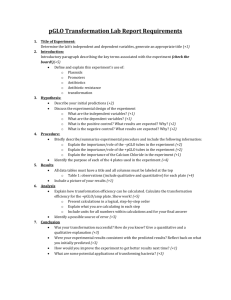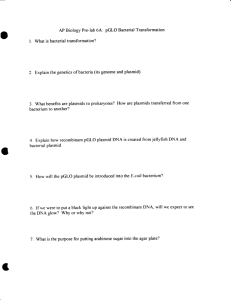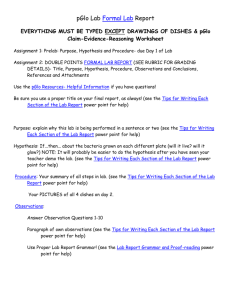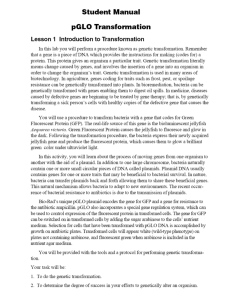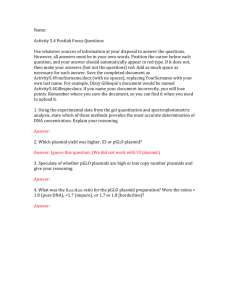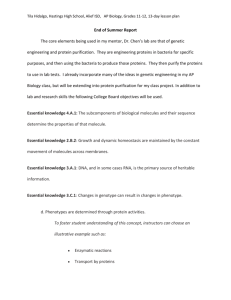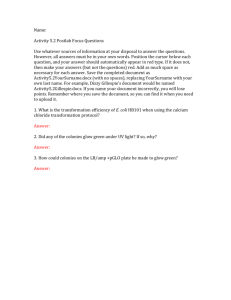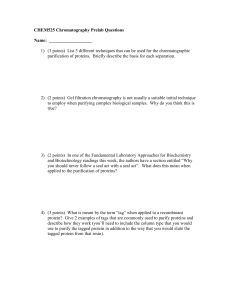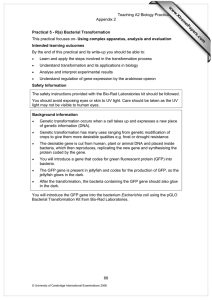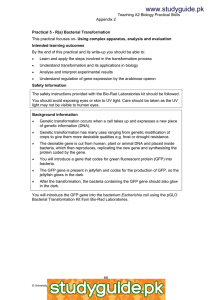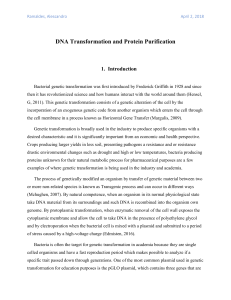Hidalgo - Symposium presentation
advertisement
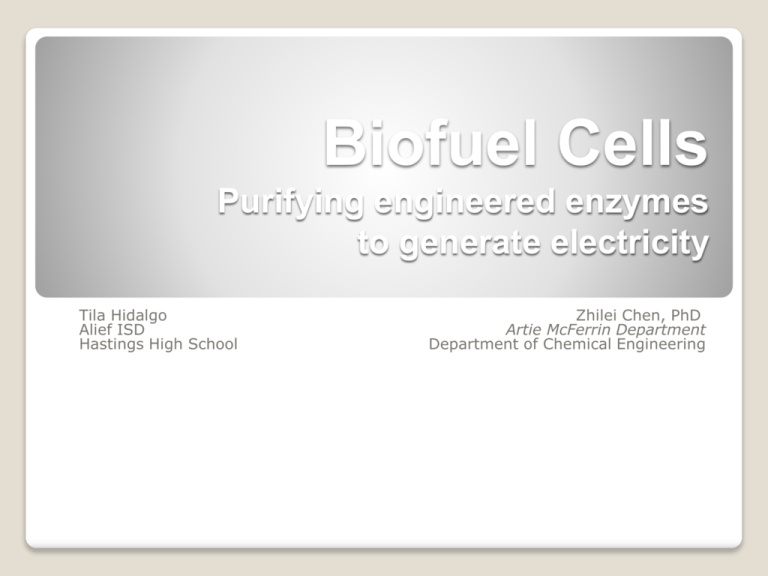
Biofuel Cells Purifying engineered enzymes to generate electricity Tila Hidalgo Alief ISD Hastings High School Zhilei Chen, PhD Artie McFerrin Department Department of Chemical Engineering Biofuel cells have great potential for real world application. Addressing issues with current models of biofuel cells by engineering proteins will provide low cost, high yield, green technology for use in living organisms. Biofuel Cells To improve power and longevity of the fuel cell. • Current Issues • Not a lot of power generated • Poor connections • Loss of enzyme from the fuel cell The Research Objective Bacterial Transformation and Protein Purification. ◦ A project for my AP Biology students. http://media.studienet.dk/images/products/medium/106750.jpg My Classroom Project: In addition to lab skills based around the inquiry model of investigation that is part of the AP Biology curriculum the following college board objectives will be covered: ◦ Essential knowledge 4.A.1: The subcomponents of biological molecules and their sequence determine the properties of that molecule. ◦ Essential knowledge 2.B.2: Growth and dynamic homeostasis are maintained by the constant movement of molecules across membranes. ◦ Essential knowledge 3.A.1: DNA, and in some cases RNA, is the primary source of heritable information. ◦ Essential knowledge 3.C.1: Changes in genotype can result in changes in phenotype. Phenotypes are determined through protein activities. To foster student understanding of this concept, instructors can choose an illustrative example such as: ◦ Enzymatic reactions ◦ Transport by proteins ◦ Synthesis ◦ Degradation Genetic engineering techniques can manipulate the heritable information of DNA and, in special cases, RNA. To foster student understanding of this concept, instructors can choose an illustrative example such as: ◦ Electrophoresis ◦ Plasmid-based transformation ◦ Restriction enzyme analysis of DNA ◦ Polymerase Chain Reaction (PCR) College Board Objectives Addressed Protein Purification Objective: Day 1 Students will perform the bacterial transformation. I plan to use the Biorad pGlo transformation. http://3.bp.blogspot.com/_voJSmT_yBgY/SW6KsVpvxI/AAAAAAAACA0/ZZWIX5HNA9c/s320/pglomap.gif Day 2-3 http://media.studienet.dk/images/products/medium/106750.jpg Research days. I want students to do a literature review of protein purification. They will use this to write a presentation answering the questions: Day 4-6 • Why is protein purification important? • What are ways that it is done? • What are limitations to these protocols? • What properties of the pGlo protein could be used to purify it? • What is your proposed protocol to purify pGlo? • The protocol will include a cost projection, specific steps to follow to purify the protein, and a method to calculate a percent yield. • The collective answer should be that the cells need to by lysed, and using the hydrophobic properties of the pGlo protein it can be purified on a column that address that property. • Methods of cell lysis can vary from group to Students will present their group as well as specific reagents to wash findings, and after will and elute the protein, but they should all develop a final protocol to have common chemical properties. purify the pGlo. Day 7-8- “Lab Meeting” www.bio-rad.com/webroot/web/software/.../pGLO_GFP_031208.pp Day 9-11- Protein Purification. Students will perform their experiments. They will then analyze their results using electrophoresis, and calculate a percent yield. Day 9-11 www.bio-rad.com/webroot/web/software/.../pGLO_GFP_031208.pp • Purity • Quantity Final • Final Cost Presentations • Percent yield • Error analysis Post Test Day 12-13 Requirement Points Methods Clearly Stated 20 Quantative and Qualative Data was included. (picture of the gel and yield) 20 Cost of protocol/g of product 10 Percent yield calculated 10 Error analysis (where can your project be improved and why? What would your next step be?) 20 Citation, organization, general presentation 10 Rubric Rough Draft TAMU E3 program National Science Foundation Nuclear Power Institute Dr. Chen and Dr. Guan Chris Skinner Acknowledgements
